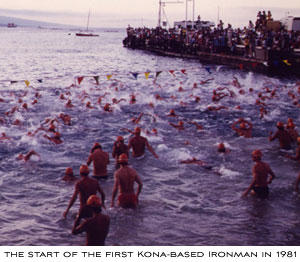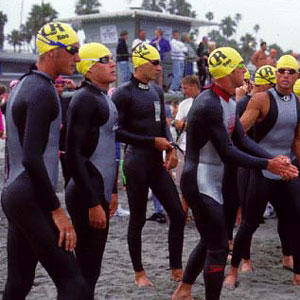
Editor's note: This is the tenth of a series of 13 weekly articles originally published on Slowtwitch in 2003/4. The articles chronicle newbie RD Jeff Henderson's journey toward the production of his first race: the Musselman Triathlon in Upstate New York. After these 13 weeks worth of diary entries, we'll flow directly into a new series Jeff is writing for us, where he talks about his challenges and goals now, as he prepares for Year-7 of Musselman.
Have you ever considered where bike racks come from? I hadn't, until I decided to run a triathlon. Now I suddenly need a million of them, and sadly they don't show up in the Sears catalog.
The obvious solution would be to rent a bunch from race companies around here that hold a handful of races every year. But that means doing the same thing next year, and the year after that—if the Musselman is to become an annual event, it makes sense to start owning things this year. But you can't buy everything with a first-year budget, and I don't have much storage space for the 364 days the Musselman is not occurring.
But this year our race has been saved by the application of a general principal I encourage all race directors to implement: share the burden. Unless you've got a new race slated for Iceland, chances are you're not the only race in your area; if you can cooperate with other RDs, your job will be that much easier. And cheaper.
There are three races happening in Upstate New York this summer that are in their infancy. The Cayuga Lake Triathlon is in its second year, the Musselman is in its first, and the Penn Yan/Keuka Lake Triathlon is in its first* year (note asterisk). We all need the same things—racks, signs, swim caps, storage—and we all have scant dinero.
I place an asterisk by Penn Yan because a triathlon has been happening in that town for several years, but this year's version has a new organizing committee, new course, new venue, and new attitude. This was necessary because, as nicely as I can put it, the old RD was less than savory. He offered to sell Jay his bike racks for highway robbery sums. So Jay needs bike racks, Ithaca borrowed the YMCA's racks last year but didn't have enough, and the Musselman needs racks. Time for some friendly cooperation among groups you might think would be competitors.
Ithaca has a metal shop and a big ol' barn for storage, so two weeks ago Jay and I journeyed down that way to tinker with bike rack designs. None of us has ever built such things before, but we had a pretty good idea what we were looking for: lightweight, strong, durable, easy to take down and put together. And, of course, cheap. Three hours later we had a workable design, a plan for assembly that the Ford Motor Company would be proud of, and a date for production of the 120 racks. We're thinking big because we don't want to do this again—and with three races coming together, the final cost for each of us will be a third.
My given task was to procure the steel tubing necessary for the legs of our structure. After a day working on the design and an hour or so calling local electrical suppliers, I am "down with the lingo" of the electrical conduit world. "I need a quote for 240 sticks of half-inch EMT," I brashly shout into the phone. Guys who work at these places like brash and they like shouting, so they know I'm for real.
When you're a race director, you end up caring very much about things you never in your wildest dreams ever thought you'd be caring about. Take the price of steel, for instance. To make 120 bike racks, we need a sizeable supply of steel tubing—Electrical Metal Tubing, to be exact, because it is galvanized to resist rust. Now, if you're familiar with the world of steel and follow the news of this particular metal, you'll know that the U.S. is currently immersed in a "supply shortage." It seems all the steel is being shipped overseas, mainly to China who is busy constructing the equivalent of eight cities the size of Columbus, Ohio in the next ten years. In March, the price of a ton of steel had risen from $80 to $200 in six months.
And since March, the price has gone through the roof. Call one supplier today, and tomorrow the price will have doubled; sometimes the steel won't even be available. I got a quote last Friday for $1.99 for a 10' section of half-inch EMT. Recognizing this as a superior price, I asked if the quote would be good on Tuesday, when I could pick it up. Of course, they assured me.
On Tuesday I strode into the supplier, inwardly prepared for the price to have jumped. I told the man behind the counter what I had been quoted and I watched a look of deep concern fall across his countenance. He punched some keys on the computer with a pained expression. He looked at me, then at the computer. Then back at me.
"Who gave you that quote?" he wanted to know.
"I didn't get a name," I replied. Then I noticed a tattered yellow sign above the counter with the same price on it. I offhandedly mentioned this to Mr. Deeply Concerned.
He turned around and stared at the sign for a few minutes—he was trapped, and he knew it. "You're getting a HELL of a deal," he finally told me, with the same gravity reserved for baptisms.
I had gotten lucky. The going price is now $3.99, double what I paid. The steel I bought is going to be cut in half and will become the supports at either end of a thicker tube of steel, which will be where you rest your handlebars or saddle. A length of 14-gauge wire will keep the legs from splaying, and stop screws will keep the top bar from sliding down the supports. Simple, strong, inexpensive, and storable.
The amount of cooperation I have encountered among race directors is refreshing. Several weeks after deciding to hold the Musselman, I placed a call to Robert Vigorito, race director of the Eagleman Half-Iron in Maryland (among others). He probably had a million other things to do at the time, but chose to dispense tips and advice for half an hour. This past month I wrote to Keith Jordan, RD of Timberman and a fine slate of other races in New Hampshire, and though you would think our races would be cutthroat competitors, he offered encouragement and advice on stocking aid stations.
Why? you may ask. I think it has something to do with the kind of people who undertake the task of staging a triathlon: by the time you get within three months of the race, you are so completely worn down and humbled by all there is to do that you feel nothing but empathy for your fellow RD. If you can save someone an hour of work, you'll do it gladly because maybe someday someone will save you an hour... and that could mean starting your race on time.
We work together here in Upstate New York, we comp each other for our races, and on Sunday afternoons we hang out and spot weld with no prior experience. And the next time you rack your bike in transition, you'll know a bit more about where they came from and what that has to do with the price of steel in China.


